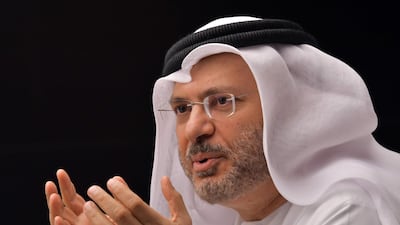Iran's destabilising policies in the Middle East must be countered, the UAE Minister of State for Foreign Affairs, Dr Anwar Gargash, said on Sunday.
“The softer approach has failed,” Dr Gargash said, at the opening session of Abu Dhabi Strategic Debate (ADSD), adding that Tehran has played a key role in emerging crises in the region.
The ADSD is the fifth such debate hosted by the Emirates Policy Centre. The theme this year is power, with the aim of understanding how the force interacts with international politics.
Dr Gargash rejected Tehran’s destabilising actions and hailed the United States for reimposing economic sanctions on Iran.
“Due to Iran’s destructive regional and global policy, we have voiced our support to President Donald Trump’s administration towards Tehran,” he said.
The US reimposed sanctions at start of this month, with a particular focus on oil and energy.
Dr Gargash said that Arab states must take further responsibility towards building regional security cooperation.
"The UAE, along with Arab states, is increasingly playing a role to address security challenges in the region. We are pushing alongside the US to form a strategic alliance to counter these issues," he said, in reference to the Middle East Strategic Alliance (Mesa), a so-called Arab Nato.
_______________
Read more:
Yemeni rebel minister flees Sanaa and defects to Saudi Arabia
Iran heroin shipment busted in biggest haul in 20 years
US says it stands with Iranians as sanctions hit Tehran
______________
Washington is pushing for deeper cooperation between the Arab states on missile defence, military training, counter-terrorism and in strengthening regional and economic and diplomatic relations.
Dr Gargash called on Arab states to adopt a collective policy against destabilising factors in the region, such as Iran and terrorism.
He also praised Saudi Arabia for contributing military and diplomatic capabilities to combat extremism and instability in the Gulf.
Additionally, Dr Gargash stressed on the need to reach peace settlements in the region including in Africa, Libya and Palestine.
“We have spared no efforts in ensuring that peace prevails in the Middle East,” he said.
The minister referred to Sheikh Zayed, founding father of the UAE, values of tolerance, commitment and compassion in shaping the country.
“This year we celebrate the centennial of Sheikh Zayed, who laid the value that shaped our country, our people and our relations with the world,” he said.
“The values of Sheikh Zayed are embodied in our openness to the world and reflect what we believe as Emiratis,” he said.
Meanwhile, Ebtesam Al Ketbi, President of the Emirates Policy Centre, said the UAE is preparing itself for the future and for what comes after oil.
“This is why we are investing in knowledge, technology and education,” Ms Al Ketbi said.
“We need to start thinking about smart power instead of soft power,” she said, adding that hard power supports the achievements of soft power.
Regional shifts have enabled the UAE to play a key role in supporting moderation and developments. The country is seen as a model for humanitarian solidarity especially when providing assistance to war-torn countries.
In Yemen, the UAE was declared the largest donor of humanitarian assistance after Saudi Arabia, according to the UN’s Financial Tracking Services.
Abu Dhabi alone has pledged nearly $4 billion in aid over three years to ease the humanitarian crisis, making it Yemen's second single largest donor.
“The accelerating shifts in the regional and international environment has pushed the UAE to intervene and take part in ensuring that stability prevails in the region,” she said.

